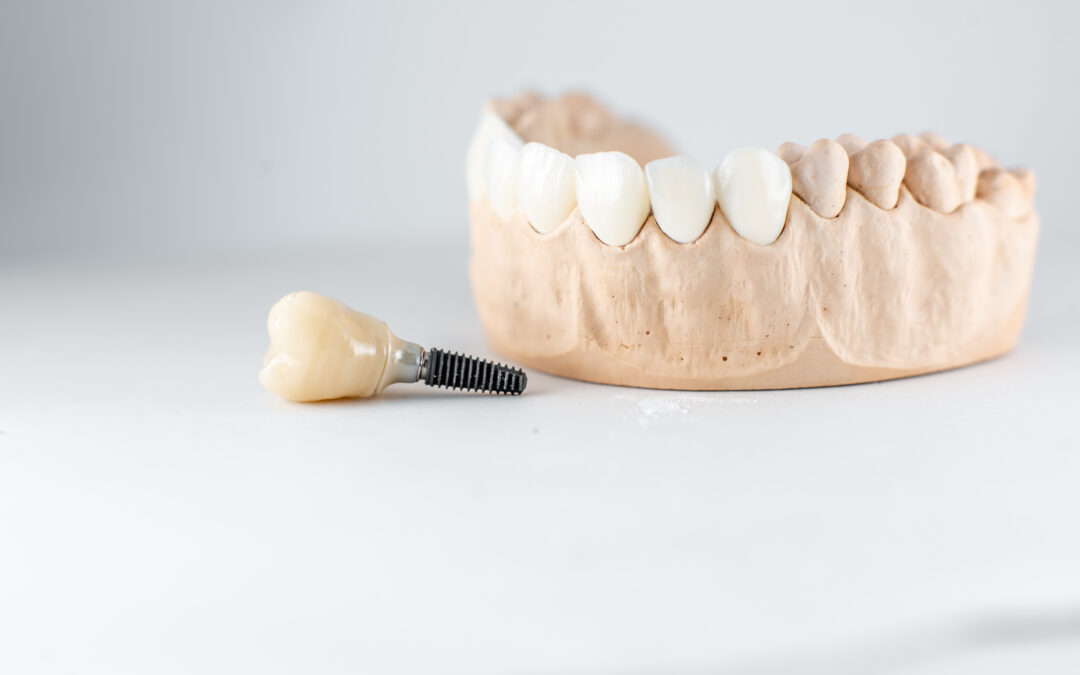If you’re missing a tooth—or several—you’ve probably heard about dental implants as a potential solution. But what exactly are they, and why are they considered one of the best options for restoring smiles?
Dental implants are a modern dental innovation designed to replace missing teeth with a solution that’s both functional and natural-looking. Unlike dentures or bridges, implants are surgically placed into your jawbone, providing a stable foundation for replacement teeth. They don’t just sit on your gums, they integrate with your bones to become a permanent part of your mouth.
In this article, we’ll explore the types of dental implants available, their many benefits, and what you can expect from the procedure. Whether you’re looking to improve your oral health or simply want your smile back, dental implants offer a life-changing option worth considering.
Key Takeaways
- Dental implants are a permanent solution for missing teeth, providing a natural look, stability, and improved functionality.
- There are several types of dental implants, including endosteal, subperiosteal, All-on-4, mini, and zygomatic implants, each suited for different needs.
- Implants offer numerous benefits, such as enhanced chewing ability, improved speech, jawbone preservation, and long-term durability.
- Proper care involves daily brushing, flossing, using implant-friendly tools, avoiding hard foods, attending regular dental checkups, and avoiding smoking.
- Choosing the right implant and maintaining proper oral hygiene can ensure a lifetime of confident smiles and optimal dental health.
How Do Dental Implants Work?
Dental implants are one of the most innovative solutions in modern dentistry, but the way they work is surprisingly simple—and brilliant. Think of them as a replacement for your tooth root. Unlike dentures or bridges, which sit on top of your gums, implants are surgically placed into your jawbone. This creates a sturdy, permanent foundation for replacement teeth that look, feel, and function like the real thing.
Here’s how the process works step by step:
- The Implant Post: The implant itself is a small, screw-like post made of biocompatible materials like titanium. This post is surgically inserted into your jawbone, where it serves as the new “root” for your replacement tooth. Over time, the bone fuses with the implant in a process called osseointegration. This is what makes implants so secure and stable.
- The Abutment: Once the implant has fully integrated with the bone (this typically takes a few months), a connector piece called an abutment is attached to the top of the implant. The abutment acts as a link between the implant and the crown.
- The Crown: Finally, a custom-made crown (the visible part of the tooth) is attached to the abutment. This crown is designed to blend seamlessly with your natural teeth in both appearance and function.
What makes implants so unique is their ability to mimic the natural structure of a tooth. By replacing the root, they don’t just sit in your mouth—they become part of it. This stability allows you to eat, speak, and smile with confidence, knowing your teeth won’t slip or move.
Types of Dental Implants: Which One Is Right for You?

There are different types of implants designed to meet different needs. Whether you’re replacing one tooth or many, there’s an implant option that can work for you. Let’s break down the main types of dental implants and how they’re used:
-
Endosteal Implants
These are the most common types of dental implants and are ideal for patients with a healthy jawbone. Endosteal implants are placed directly into the bone and act like artificial tooth roots. Once the implant integrates with the jawbone, a crown, bridge, or denture is attached. They’re a great option for most people and are known for their durability and natural feel.
-
Subperiosteal Implants
If you don’t have enough bone density for endosteal implants and can’t undergo a bone graft, subperiosteal implants may be the solution. Instead of being placed into the jawbone, these implants sit on top of the bone but beneath the gum tissue. A metal frame supports the replacement teeth. While less common, they’re ideal for patients with significant bone loss.
-
All-on-4 Implants
This is a revolutionary option for patients missing most or all of their teeth. All-on-4 uses just four strategically placed implants to support a full arch of replacement teeth. It’s a faster, less invasive alternative to traditional full-mouth implants, often allowing patients to leave with a new smile the same day.
-
Mini Implants
Smaller than traditional implants, mini implants are used when there’s less space or bone density to work with. They’re less invasive to place and are often used to stabilize dentures. While they’re not as durable as full-sized implants, they’re a great solution for certain situations.
-
Zygomatic Implants
For patients with severe bone loss in the upper jaw, zygomatic implants provide a specialized solution. Instead of being anchored in the jawbone, these implants are secured in the cheekbone (zygomatic bone). Though rare, they’re an excellent alternative for complex cases where traditional implants won’t work.
Which Type Is Right for You?
The right type of implant depends on several factors, including the health of your jawbone, the number of teeth you’re replacing, and your overall oral health. During a consultation, your dentist will evaluate your unique situation and recommend the best option for your smile.
No matter which type of dental implant you choose, the result is the same: a functional, natural-looking smile that boosts your confidence and improves your quality of life.
Benefits of Dental Implants
Dental implants do more than just fill gaps in your smile, they completely transform how you eat, speak, and feel about yourself. They’re considered the gold standard for tooth replacement for a reason. Let’s take a closer look at why dental implants stand out:
A Natural Look and Feel
Dental implants are designed to mimic your natural teeth, both in appearance and function. The crown is custom-made to match the color, size, and shape of your existing teeth, so no one will ever know it’s not real.
Long-Lasting and Durable
Unlike dentures or bridges, which may need frequent adjustments or replacements, dental implants are built to last. With proper care, they can stay functional for decades—or even a lifetime.
Enhanced Comfort
Since implants fuse directly with your jawbone, they feel completely secure and comfortable. There’s no slipping, clicking, or irritation—just a stable foundation that feels like your own teeth.
Improved Chewing and Eating
Say goodbye to food restrictions! Dental implants restore nearly 100% of your chewing power, allowing you to enjoy your favorite foods without worry. From crunchy apples to chewy steaks, implants let you eat with ease.
Better Speech:
Poorly fitting dentures can make speaking difficult, causing slurring or mumbling. Implants, on the other hand, function like natural teeth, helping you speak clearly and confidently.
Supports Jawbone Health
When a tooth is lost, the surrounding begins to shrink over time. Dental implants stimulate the jawbone, just like natural teeth, preventing bone loss and preserving your facial structure.
A Long-Term Investment
While implants may have a higher upfront cost, their durability and longevity make them a cost-effective choice over time. You won’t have to deal with frequent replacements or repairs, saving money in the long run.
Caring for Your Dental Implants
Dental implants are a significant investment in your smile and quality of life, so taking care of them is essential to ensure they last for years to come. The good news? Caring for dental implants isn’t complicated, it’s a lot like taking care of your natural teeth. Here are some tips to help you keep your implants in top shape:
- Brush and Floss Daily: Yes, even though implants aren’t natural teeth, plaque and bacteria can still build up around them. Brush twice a day using a soft-bristled toothbrush and fluoride toothpaste to keep your implants and gums healthy. Floss daily to clean those hard-to-reach areas, especially around the implant base.
- Use the Right Tools: Consider using tools specifically designed for implants, such as interdental brushes or water flossers. These can help remove plaque from around the implant without damaging the surrounding tissue.
- Avoid Hard or Sticky Foods: While implants are durable, biting down on extremely hard foods (like ice or unpopped popcorn kernels) or sticky candies can potentially damage the crown or loosen the implant. Stick to foods that won’t put unnecessary stress on your new smile.
- Don’t Skip Dental Checkups: Regular dental visits are crucial for maintaining your implants. At Detroit Dental, we offer comprehensive implant care to ensure everything stays in great shape. During your checkups, we’ll inspect the health of your gums, check the stability of your implants, and give them a professional cleaning to keep them functioning perfectly. Scheduling routine visits as recommended, is one of the best ways to extend the life of your implants.
- Protect Your Implants While Sleeping: If you grind or clench your teeth at night (a condition called bruxism), it’s important to use a nightguard. Grinding can put excessive pressure on your implants, potentially causing damage over time.
- Stop Smoking: Smoking can slow down the healing process after implant placement and increase the risk of implant failure. If you’re serious about maintaining your implants, quitting smoking is one of the best things you can do.
Final Thoughts
Dental implants are an incredible investment in your oral health, confidence, and quality of life. With proper care and regular dental visits, they can provide you with a functional, natural-looking smile that lasts for decades. Whether you’re brushing daily, protecting your implants from unnecessary stress, or scheduling checkups, consistency is the key to their long-term success.
Looking for dental implant in Detroit, Detroit Dental is here to support you every step of the way. From your initial consultation to ongoing care, our team is dedicated to helping you enjoy a beautiful, healthy smile for years to come. If you have any questions about caring for your dental implants or think you’re ready to start your implant journey, don’t hesitate to reach out. Your smile deserves nothing less than the best!

